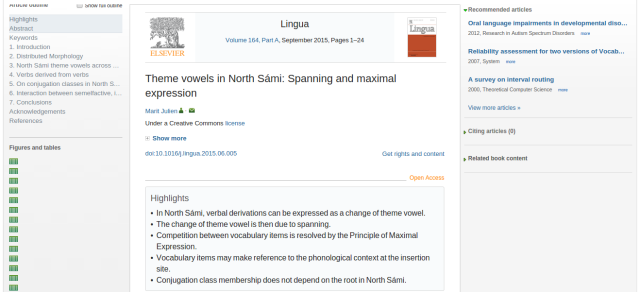
The entire editorial staff of the prestigious academic title Lingua have resigned in protest over the high cost of subscribing to the journal, and the refusal of the journal's publisher, Elsevier, to convert the title completely to open access. The open access model allows anyone, whether an academic or not, to read a journal online for free. Currently, most academic journals are funded by subscriber payments; with open access journals, the model is flipped around, with institutions paying to publish their papers.
As Inside Higher Ed reports, the academics who have made Lingua into one of the top journals in its field through their editorial work all gave up their roles after telling Elsevier of the "frustrations of libraries reporting that they could not afford to subscribe to the journal and in some cases couldn't even figure out what it would cost to subscribe."
Subscription prices for academic titles have been rising faster than inflation for many years, which means that libraries have been forced to drop some journals to pay for others that are more in demand. The lack of clarity on pricing is a result of publishers requiring libraries to pay for "bundles" of titles. Although bulk purchasing should in theory lead to lower prices for libraries, it also removes much of the power of institutions to pay for exactly the titles they want, and often means libraries end up with subscriptions to titles no one wants to read.
Led by the executive editor of the journal, Johan Rooryck, the editors of Lingua, which means "tongue, language" in Latin and Italian, are setting up their own, fully open-access journal. The new journal, in a rather fantastic case of academic pugilism, is called Glossa, which means "tongue, language" in ancient and modern Greek.
Rooryck said he doesn't expect to earn anything from Glossa, which he hopes to launch early next year, and told Inside Higher Ed: "I'm doing this for purely idealistic reasons." He said that some of his colleagues are talking to editors on other journals, who may follow the example of Lingua, and launch their own open access replacements in preference to working on traditional journals that are increasingly unaffordable even for well-financed libraries.
The open access movement formally began about 15 years ago. Since then, there have been increasing calls from academics and universities to adopt its business model for publishing research results. One reason is that most such work is funded by the taxpayer, so it is unfair to expect people to pay again to read the results of the research when it is published in traditional journals.
The other reason is straight up price-gouging: science publishers have pushed up journal prices to such an extent that many libraries struggle to provide the titles their researchers need. Because of its size and fat profit margins, Elsevier has emerged as a frequent target for open access supporters. In 2012, a site called "The Cost of Knowledge" was set up to encourage academics to boycott Elsevier. Since then, over 15,000 researchers have pledged not to work with the company "unless they radically change how they operate."
reader comments
21